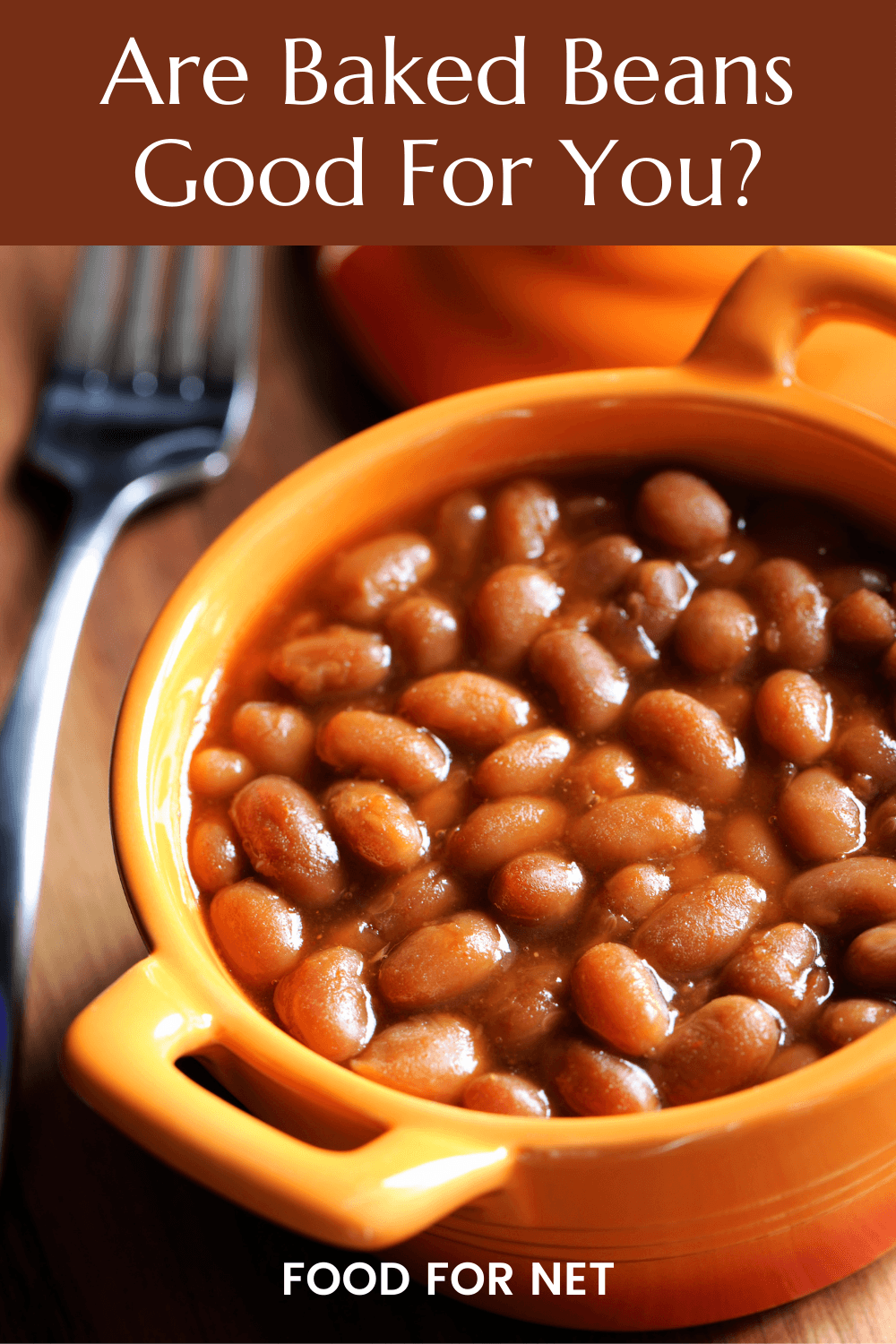
Beans can be incredibly healthy. That’s no secret. They’re a fantastic source of protein and fiber, while providing many nutrients as well. But, those claims generally refer to beans themselves. Are baked beans good for you too?
After all, baked beans can be fairly processed. You’re often buying them in a can, heating them, and then eating them – either on their own or as part of a larger meal. The rich tomato sauce that the beans are served in makes them delicious and, honestly, what could be easier?
The processing steps, along with the added ingredients aren’t great news for health. Still, don’t write baked beans off just yet. They do still have some benefits.
Are Baked Beans Good For You?
- What Are Baked Beans?
- The Benefits Of Baked Beans
- Are Baked Beans High In Antinutrients?
- Are Baked Beans Vegetarian?
- Final Thoughts
What Are Baked Beans?
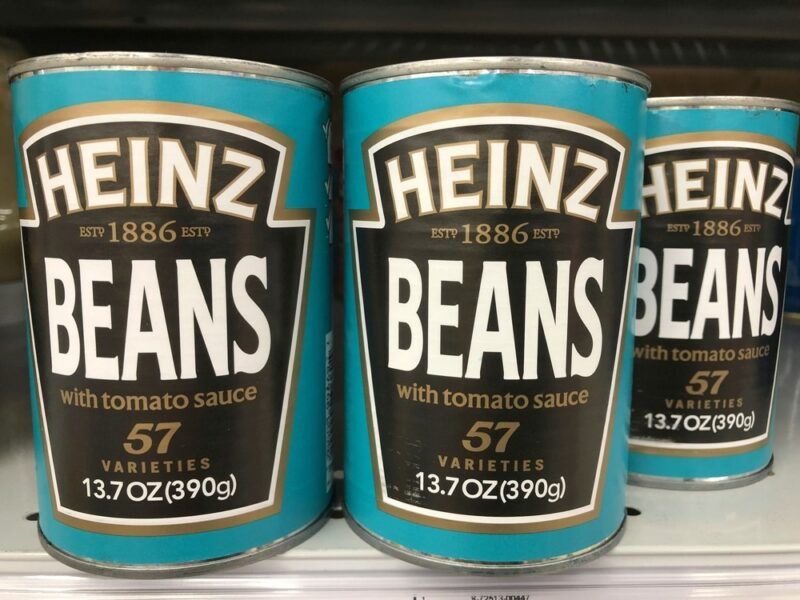
What you mean by baked beans will depend on where you live. The beans are incredibly popular in the United Kingdom, where the beans tend to be stewed in sauce. More often than not though, people rely on canned baked beans instead, with Heinz being an incredibly popular brand.
In the United States, baked beans do tend to be baked and are often sweetened with maple syrup, molasses, or brown sugar, which add a richness to the dish. Pieces of salted pork may be added too, along with herbs, spices, and other flavoring ingredients.
There are other ways to prepare baked beans as well, including on the stovetop or in a slow cooker. Slow cooker baked beans mean that you can set things up and leave the beans to cook on their own.
While there are plenty of variations, baked bean dishes tend to rely on white beans, often navy beans, and a rich tomato-based sauce.
Canned baked beans are exceptionally popular too. They’re already fully cooked (via steaming, rather than being baked), so they act as an easy source of protein and nutrients. Plus, they’re inexpensive, making them perfect when finances are stretched thin.
Some people even choose to eat baked beans cold, straight from the can. There’s no risk to doing so, although heating them first is much more popular.
The Benefits Of Baked Beans
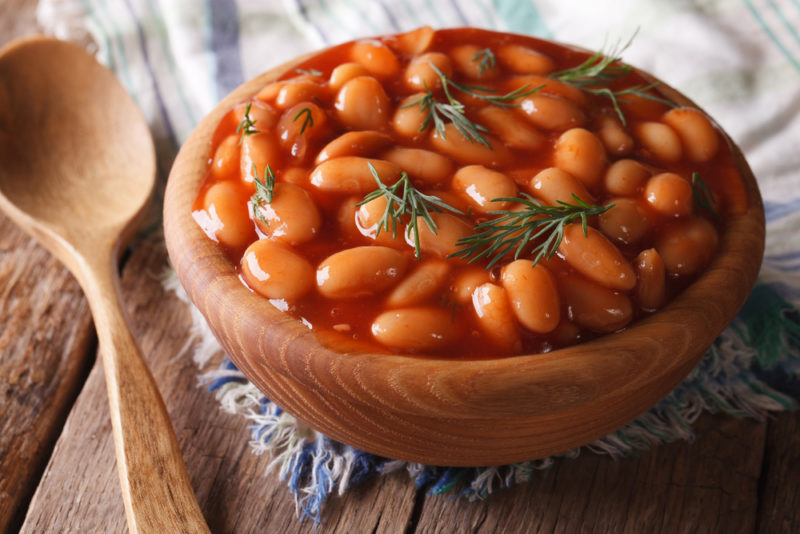
Still A Decent Source Of Nutrients, Fiber, And Protein
Baked beans are primarily a bean-based dish. Sure, there are added ingredients too, but we’re mostly just talking about beans.
Not surprisingly then, you’re getting many of the benefits that you see with regular beans, including a decent amount of protein. For example, a half cup serving of Bush’s Best Original Baked Beans gives you 6 grams of protein and 5 grams of fiber.
You’re also getting important nutrients, like iron, selenium, vitamin B1, magnesium, and potassium.
The protein and fiber make baked beans an easy meal, one that should keep you satisfied for a while. You may also see health benefits, particularly if you choose to focus on plant-based meals like baked beans, rather than fatty cuts of red meat.
In fact, despite the salt and sugar in baked beans, studies show that they can help to improve cholesterol levels.
There Are Antioxidants Too
You’ll also get some antioxidants from baked beans. Those compounds are famous for their ability to decrease oxidation and may even protect you against disease.
Baked beans won’t be a great source of antioxidants, especially not if you’re focusing on canned baked beans, as these have been highly processed. You’ll get many more antioxidants from fresh fruit, vegetables, herbs, and spices.
Still, there are some antioxidants present. Besides, if you don’t have much fresh food in your diet (which could be the case if money is tight), the antioxidants in baked beans could easily be significant.
Convenience
While beans are fantastic sources of protein, they’re also frustrating. Dried beans, the most common type, need to be soaked for hours before use and even then they may take an hour or more to cook fully.
Messing around with soaking and a long cook time gets frustrating for people with hectic schedules and not that much free time. You could reduce the effort by using a slow cooker, but even then, you need to plan your meals well.
Baked beans get around the problem entirely, as the beans are already cooked. You just need to heat them up. What could be easier when you need something filling and relatively healthy?
The Problems With Baked Beans
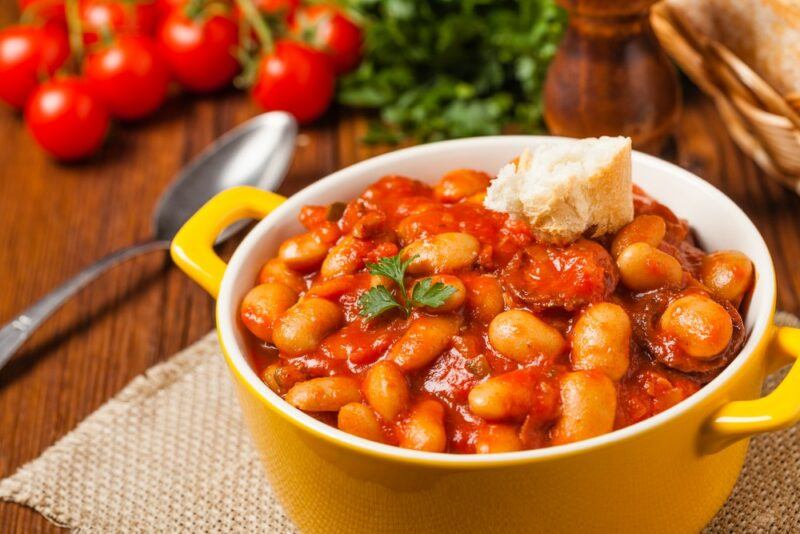
They Can Be High In Sugar
While baked beans do offer the same nutrients that you find with regular beans, they often have added ingredients, including some type of sweetener, like brown sugar, white sugar, or even corn syrup.
Other additions can include vinegar, mustard, tomato sauce, herbs, and spices.
The sugar is the biggest problem here. We all know how many problems sugar has been linked to, including increased diabetes risk, weight gain, and inflammation. Sugar may even affect your mood and make you more vulnerable to depression.
The amount of sugar in baked beans can be quite shocking. For example, a half cup serving of Bush’s Best Original Baked Beans contains 12 grams of sugar. Some brands will have more than this, while others will have less.
This is frustrating as, honestly, you can barely taste the sugar much of the time.
Thankfully, some companies produce low sugar versions and even ones with no added sugar at all. You’ll need to shop around to find them.
The Sodium Content
Baked beans often contain a decent amount of salt too. This is another concerning area. You might get around 20% of your daily sodium intake from a single serving of the beans. That’s appalling, especially as many of us need to cut down on our sodium intake.
This issue is common with canned foods. Some of the cooking and canning processes decrease the flavor of food, but salt still tastes just as good, so companies often load up with salt (and sugar!).
This starts to be a serious problem if you rely on canned foods often. And, unlike regular canned beans, you can’t rinse baked beans to reduce their sodium content.
You can find low sodium baked beans. Be sure to check the ingredients label carefully though, as some products still contain more sodium than you’d expect.
Finally, canned baked beans often rely on additives, including caramel coloring, natural flavors, and modified corn starch. These ingredients have all been tested for safety, but there are still concerns about how they influence our health.
Some Cans Use A BPA Lining
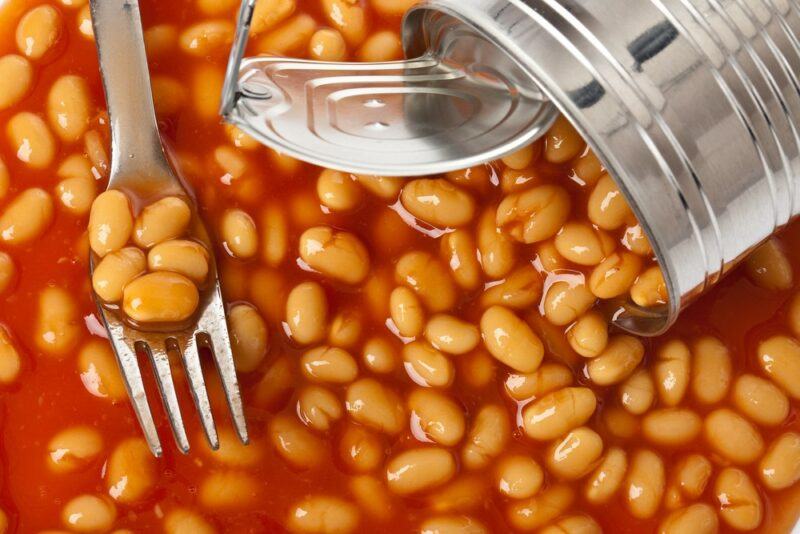
Some companies use a chemical called bisphenol A (BPA) in the lining of their cans, which can leach into the food. In fact, one Canadian study found that baked beans had higher detectable levels of BPA than many other canned foods.
Manufacturers and regulators still tend to see BPA as no big deal, partly because the amount that ends up in your food is low. However, many people dispute this claim, saying that BPA is concerning and could cause serious problems.
Plus, the amount of BPA in some canned foods can get surprisingly high. Sometimes the BPA exceeds your daily limit by a considerable amount – and you can’t tell this by the flavor of your food.
To avoid this issue, it’s best to focus on canned foods that don’t use a BPA lining at all. Some companies do avoid BPA, particularly those that try to be as natural as possible.
Limiting your intake of canned foods can help as well. This might mean that you still enjoy baked beans from a can, but only once a week or so.
They Can Cause Gas
Beans are famous for causing gas. The effect comes from the fermentation of oligosaccharides that the human body can’t digest fully. The fiber in the beans might contribute to gas too, particularly if you’ve recently increased your fiber intake.
Interestingly, baked beans can cause more gas than some types of dried beans.
While the gas can be frustrating and embarrassing, most people don’t need to worry about it. Some gas is a natural part of the digestion process. It simply means your body is doing what it needs to.
In fact, gas from beans often isn’t as common as we expect (the idea has simply been blown up by popular media). Many people don’t get this side effect at all.
They’re Often High In FODMAPs
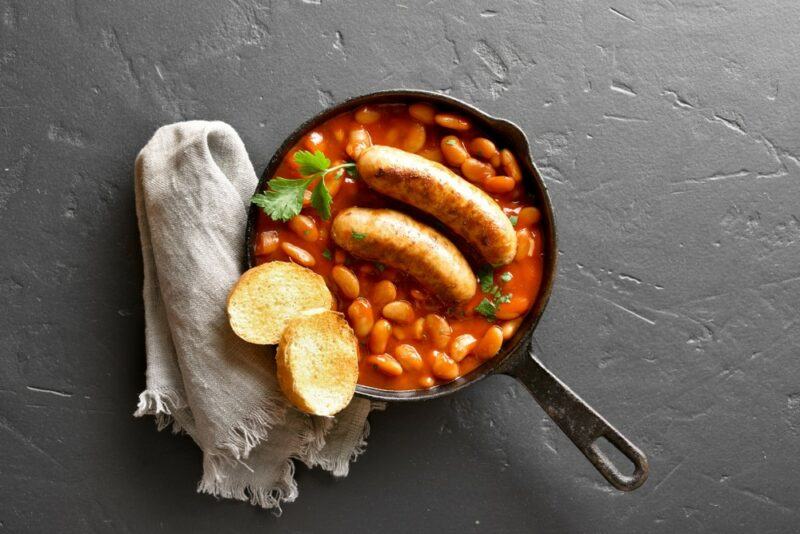
The term FODMAPs refers to a collection of fermentable carbs, including oligosaccharides, disaccharides, monosaccharides, and polyols. These carbs can cause significant digestive side effects in some people, including those with irritable bowel syndrome (IBS).
People with IBS or other digestive sensitivities often choose to focus on low FODMAP foods. It often helps to cut all high FODMAP foods out entirely for a while, then reintroduce them slowly. Doing this allows you to see which ones your digestive system is sensitive to.
The elimination and reintroduction approach is important, as FODMAPs aren’t a problem for most people. Many high FODMAP foods are also packed with nutrients and offer plenty of benefits, so it’s best not to exclude them unless you need to.
As you can probably guess, baked beans fall into the high FODMAP category. With regular beans, you can decrease the FODMAP content somewhat by soaking the beans and draining them, as FODMAPs are water soluble. This trick doesn’t work with baked beans, as you’re consuming the surrounding liquid, as well as the beans.
What We Serve Them With
The final issue with baked beans comes from the way that we serve them. Dried beans tend to make their way into healthy dishes, often with whole grains and plenty of vegetables.
The same isn’t true for baked beans. Instead, baked beans are often served with toast or sausages, or perhaps as part of a fried breakfast. Some recipes even include salted pork as an ingredient.
These types of additions make it more difficult to eat baked beans in a healthy way.
Are Baked Beans High In Antinutrients?
Antinutrients are a common reason for avoiding legumes, as these compounds decrease your absorption of some nutrients. Thankfully, antinutrients aren’t as bad as they sound and don’t cause a problem for most people.
Still, it’s best to have at least some meals that are low in antinutrients, to make sure you get all the vitamins and minerals that you need. That begs the question, where do baked beans fall?
Well… you are still getting antinutrients, including phytate. However, the antinutrient concentration is lower compared to dried beans, due to the cooking and canning processes.
Are Baked Beans Vegetarian?

Despite relying on beans, baked beans aren’t always a vegetarian dish. Some products use small amounts of pork or bacon to provide extra flavor.
The inclusion of such ingredients should be obvious from the packaging, but it’s always worth checking the ingredients label, just to be on the safe side.
Final Thoughts
Baked beans are a delicious way to get all the benefits of beans. However, the canned versions are also packed with problems, including too much sugar and salt, the use of additives, and the potential for BPA to leach from the can into your food.
You can avoid some of those issues by choosing the product carefully. Brands that focus on being as natural as possible are a good place to begin. Look for ones that also keep the sugar and sodium content low and rely on BPA-free cans.
Or, why not take things a little further and make baked beans yourself?
Doing so is less convenient than simply heating beans from a can, but you get much more control over the quality and the ingredients used. As such, you can easily decrease the salt content until you get the right amount for your needs.
Frequently Asked Questions
What Beans Are Used For Baked Beans?
Baked beans generally rely on white beans. Navy beans are the most common type for commercial based beans, although home cooks may use other types.
How Many Carbs Are In Baked Beans?
The carbs vary somewhat between brands, but you’re often looking at more than 50 grams of carbs in a single serving. That’s a lot, even if you’re not following a low carb diet.
Are Baked Beans Good For Weight Loss?
They can be, as they’re a decent source of protein and fiber, without being too high in calories. However, some brands of baked beans contain added sugar, so it’s best to look out for low sugar ones. Or, better yet, make them at home.
Are Baked Beans Vegan Friendly?
Baked beans are generally good for vegans, as they just contain beans, tomato sauce, and perhaps some sugar or additives. It’s important to keep an eye on the ingredients label though, as some products also have bacon or sausages.
Are There Any Sugar Free Baked Beans?
While sugar is common in baked beans, it isn’t essential. You can make baked beans at home without any sugar or look for no sugar added brands. However, none of these will be completely sugar free, as there is some natural sugar in beans and tomato sauce.



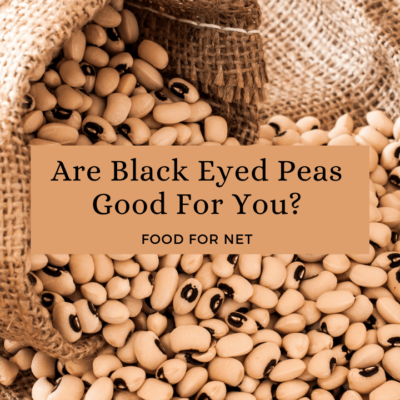
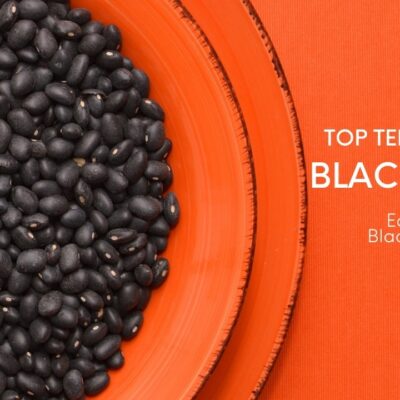
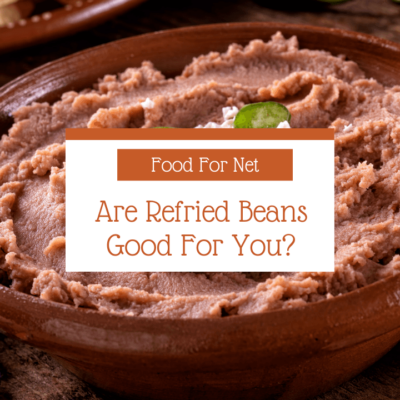


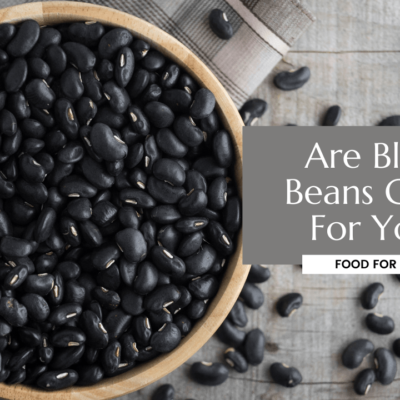
 12 Best Foods For Brain Power, Plus Five Natural Ways To Boost Brain Function
12 Best Foods For Brain Power, Plus Five Natural Ways To Boost Brain Function
Leave a Reply